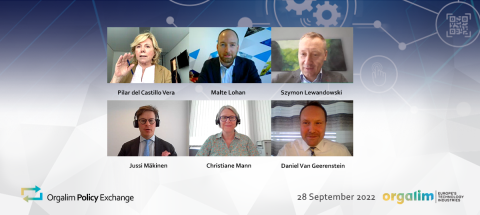Industrial Data Sharing: How can European industry make the most out of the Data Act?
29 September 2022

Data is rapidly becoming central in our economies. The change does not involve only the quantity of data shared, but also the way it is processed and stored. In light of this fast-growing data economy, in February 2022 the European Commission published a proposal of the Data Act, a set of rules governing how data can be processed and shared.
With this proposal, the Commission aims to open opportunities for data-driven innovation and make data more accessible for all. This regulation will of course have an impact on European companies. How the Data Act can achieve its goals without imposing substantial costs to our industries – and accidentally damaging their future competitiveness – was the focus of Orgalim’s latest Policy Exchange.
Seizing opportunities
The transition to a data-driven economy “is of paramount importance for the future growth of our industries”, said the moderator of the Policy Exchange Daniel van Geerenstein, Chair of Orgalim Digital Transformation WG and Deputy Director of Legal, VDMA. There are multiple potential benefits for companies. “Data flows make it possible to increase manufacturing productivity and tap into new efficiency gains, while simultaneously enabling new data-driven services and business models”, outlined Orgalim’s Director General Malte Lohan, who also reminded us how data can support EU sustainability goals, and ultimately strengthen the industries’ resilience.
Data flows make it possible to increase manufacturing productivity, tap into new efficiency gains and enable new data-driven services and business models.
Get the balance right
One of the biggest challenges of the Data Act will be to incorporate industry’s reality into its overall aspirations. Christiane Mann, Vice President Industry Affairs Smart Infrastructure, Siemens AG and Chair of the T&D Europe Smart Grids Micro Grids Working Group and Jussi Mäkinen, Director EU Regulation, Technology Industries of Finland, shared the industry’s point of view on this regulation, as well as their main concerns. Both agreed on the importance of avoiding unnecessary burdens for companies, and keeping a flexible legal framework, on the basis of contractual freedom. For Ms Mann, the complexity of the European industry cannot be addressed with a “one size fits all” approach: “rules need to reflect the different contexts in which data is shared and used”. She put particular emphasis on the importance of protecting the intellectual property of a company: trade secrets must be protected. “As it is now, access to data and data sharing stipulations in the Data Act are too vague and broad: sharing information for free can be a danger to any kind of company”. A concern shared by Mr Mäkinen: “We need to get the balance right. We need a minimum level of regulation, to keep the market mechanism going, and make the most out of data sharing without putting in danger our competitiveness”.
Data collaboration within and across Europe's industries will be key to future innovation and economic growth.
The session closed with a Q&A round, and an exchange of ideas among panellists which further explored the implications of the proposed regulation.
Read Orgalim's position and recommendations on the proposed Data Act in full here. If you are interested in our work in the field of industrial data sharing, you can also read our Legal Guide on Industrial Data. In case you missed this debate, you can watch a replay of the session below or by clicking here. You can also download a copy of the presentation slides here.
And stay up to date with the latest news by subscribing to our newsletter!

LATEST NEWS
How can we create a dynamic, competitive European high-tech manufacturing base?
Orgalim's key recommendations offer policymake...
